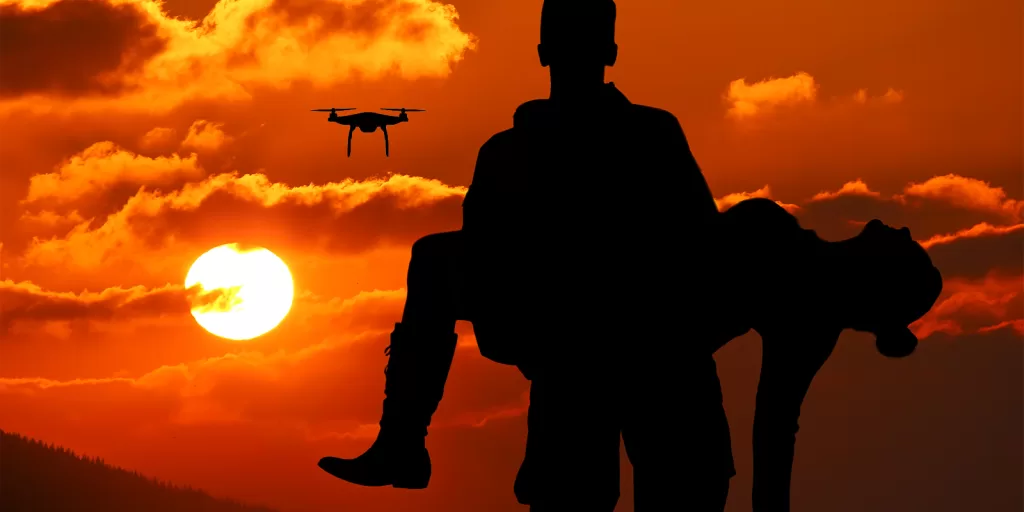
In a significant development, the federal government has expressed concerns about Chinese-manufactured drones, specifically those made by DJI, potentially collecting flight information that could jeopardize homeland security. The Countering CCP Drones Act, introduced by Representative Elise Stefanik, proposes adding DJI to the FCC Covered List, effectively dismantling approximately 90% of all public safety drone operations. This move has sparked strong opposition from first responders and public safety advocacy groups, who argue that such a ban could severely impact public safety operations across the United States.
Understanding the Countering CCP Drones Act
(H.R.2864 — 118th Congress, 2023-2024)
The Countering CCP Drones Act mandates the Federal Communications Commission (FCC) to designate telecommunications and video surveillance equipment or services from Shenzhen Da-Jiang Innovations Sciences and Technologies Company Limited (commonly known as DJI Technologies) as posing an unacceptable risk to U.S. national security. This designation would restrict federal funding from being used to purchase or maintain DJI products under specified FCC programs. Beyond federal use, such a listing could significantly impact DJI’s market access and usage across various sectors.
Understanding the Federal Concerns
The federal government’s primary concern is that Chinese-made drones might be collecting and transmitting sensitive flight data, which could be accessed by foreign governments. This poses a substantial risk to national security, particularly for agencies engaged in sensitive and critical missions.
Potential Impacts on Public Safety
Banning DJI drones would disrupt essential public safety operations. The California Fire Chiefs Association, representing over 800 fire agencies, along with public safety advocacy groups like the Law Enforcement Drone Association (LEDA) and the Airborne Public Safety Association, have voiced concerns. They argue that DJI drones play a critical role in saving lives and managing emergencies, and an outright ban without proven security breaches is impractical and dangerous. The over-reliance on unproven alternatives could compromise the effectiveness of first responders.
Strategies for Adapting to the New Regulations
Given the potential ban on Chinese-made drones, law enforcement agencies and first responders need to implement strategic measures to adapt effectively:
1. Assess Critical Needs:
- Conduct a comprehensive review of your current drone operations to identify which specific capabilities and features of the disallowed drones are essential.
- Prioritize the functionalities that are most critical for your operations, such as high-resolution imaging, flight stability, range, and endurance.
- Develop a detailed list of requirements to guide the search for suitable alternatives.
2. Enhance Cybersecurity Measures:
- Implement robust cybersecurity protocols to protect against data breaches and unauthorized access.
- Use secure communication channels and encrypted data storage for all drone operations.
- Regularly conduct security audits and updates to ensure all systems are protected against emerging threats.
- Train staff on best practices for cybersecurity to ensure compliance with protocols.
3. Explore Domestic Alternatives:
- Research American-made drones and those from allied countries that meet security regulations and operational needs.
- Engage with drone manufacturers and suppliers to understand the capabilities and limitations of available models.
- Participate in industry forums and trade shows to stay updated on the latest advancements in drone technology.
4. Collaborate with Manufacturers:
- Establish partnerships with domestic drone manufacturers to develop or customize drones tailored to your specific needs.
- Provide feedback on operational requirements and challenges to help manufacturers innovate more effectively.
- Explore opportunities for joint development projects or pilot programs to test new technologies.
5. Seek Temporary Waivers:
- If the Chinese-manufactured drones are critical for certain operations, request temporary use permissions or waivers from federal authorities.
- Present a comprehensive plan for transitioning to compliant alternatives, including detailed timelines and security measures.
- Highlight the potential impact on public safety operations to support your request for a temporary waiver.
6. Invest in Research and Development:
- Allocate resources for research and development to create or enhance compliant drone alternatives.
- Partner with universities, tech startups, and defense contractors to drive innovation in drone technology.
- Seek funding opportunities, such as grants or public-private partnerships, to support R&D efforts.
7. Adjust Operational Strategies:
- Modify your operational strategies to adapt to the lack of specific drones.
- Develop new protocols and procedures to utilize a combination of different tools and techniques to achieve similar results.
- Consider temporary scaling back certain activities until a suitable solution is found.
8. Invest in Training:
- Ensure personnel are trained and certified in using new drone technologies and methodologies.
- Provide ongoing training programs to keep staff updated on the latest advancements and best practices.
- Develop specialized training modules for cybersecurity and data protection to ensure compliance with new protocols.
9. Monitor Compliance and Engage Policymakers:
- Maintain thorough documentation of your efforts to comply with new regulations.
- Monitor ongoing adherence to the regulations and address any compliance issues promptly.
- Regularly report to federal authorities to demonstrate your commitment to addressing security concerns.
- Actively engage with policymakers to provide feedback on the impact of the regulations and advocate for necessary support and resources.
Lawmakers Push for Ban on Chinese-Made Drones, but Chinese Companies Adapt
Lawmakers in the House and Senate are advocating for legislation to ban Chinese-made drones from entering the United States. However, leading Chinese drone manufacturers are already taking steps to circumvent these potential restrictions.
One of China’s largest drone makers, Da Jiang Innovations (DJI), is partnering with U.S.-based Anzu Robotics to license its technology for sale in the American market. Additionally, Hong Kong-based Cogito Tech Company Limited registered with the Federal Communications Commission (FCC) in August 2023 to sell drones in the U.S. Experts note that two of its approved drone models, the Specta Air and Specta Mini, are nearly identical to DJI products.
These actions indicate that China’s dominant drone companies are determined to ensure their products reach U.S. consumers, even if Congress enacts a ban similar to the recent TikTok prohibition. Chinese drones, often sold at lower prices than their U.S. counterparts, have raised concerns about the viability of the U.S. drone industry. DJI currently controls approximately 70% of the global commercial drone market and about 80% of the U.S. market.
Derek Scissors, a senior fellow at the American Enterprise Institute specializing in China’s economy and U.S.-Asia economic relations, highlighted the security risks associated with drones. He pointed out that data collected during flights could be valuable, especially if used by U.S. government offices.
“U.S. government offices should not be using Chinese drones, because both the data collection in the field and with regard to the use could be sensitive,” Scissors said.
Seven states have already banned the use of Chinese-produced drones by state agencies, including law enforcement. DJI and another major Chinese drone company, Autel, have ties to the Chinese Communist Party and China’s military, raising further concerns at the Pentagon. Current legislation prevents the Defense Department from purchasing Chinese drones.
Both DJI and Autel have faced criticism for their alleged involvement in surveillance activities and human rights abuses against the Uyghur population in China.
Representative Elise Stefanik (R-N.Y.), a close ally of former President Trump and a potential vice presidential candidate, has sponsored the Countering CCP Drones Act. This legislation would add DJI to the FCC covered list, effectively banning it from operating in the U.S. by prohibiting its use of U.S. communications infrastructure. The bill has passed the House Energy and Commerce Committee.
DJI to End Flight Sync Capabilities in the U.S. Starting June 2024
In a significant policy shift, DJI has announced it will discontinue flight sync capabilities for consumer and enterprise drone operators in the United States beginning June 2024.
Historically, while flight records, images, and videos were not automatically collected and synced with DJI’s servers, drone operators had the option to opt-in for syncing this data, particularly useful when sending drones for repair or after-sales service.
DJI’s decision comes as part of a broader evaluation of its data policies, aiming to align with market demands and privacy expectations. As a result, U.S. drone operators will no longer be able to sync their flight records to DJI’s servers.
Moreover, DJI will cease generating and displaying thumbnail previews on the DJI Fly app interface for consumer drones globally. However, this change will not impact enterprise drone operators, as their drones did not feature thumbnail previews.
This policy update marks a notable change in DJI’s approach to data management and privacy, reflecting the company’s ongoing adaptation to regulatory and market environments.
Conclusion: The Takeaway
The federal directive to discontinue the use of Chinese-made drones presents significant challenges for law enforcement agencies and first responders. However, by implementing strategic measures such as enhancing cybersecurity, exploring domestic alternatives, collaborating with manufacturers, and investing in research and development, agencies can navigate this new landscape effectively. The goal is to develop a balanced approach that addresses national security concerns while maintaining the effectiveness of public safety operations.
As the Senate Armed Services Committee prepares to review the National Defense Authorization Act, the concerns raised by first responders highlight the critical need for a nuanced approach to legislation impacting public safety and national security. By working together with lawmakers, public safety agencies can help develop strategies that protect both national security and the lives of American citizens.
If you have any questions, let us know! If you’d like to hire us, you can get more information here.
Written by: Tony Marino, MBA – FAA Certified Part 107 Commercial Drone Pilot and Chief Business Strategist at Aerial Northwest
Disclaimer: The information provided in this blog post is for general informational purposes only and should not be construed as legal advice.

DRONE BUSINESS STRATEGY MAGAZINE
A free digital publication made exclusively for all small business drone pilots to them help start-up, become profitable while sustaining a competitive advantage within the drone service industry sector they opt to serve.
“If you love to fly, we’d love to have you come aboard!”
We share your information with no one. Our Privacy Policy.









Leave a Reply
Your email is always safe with us.